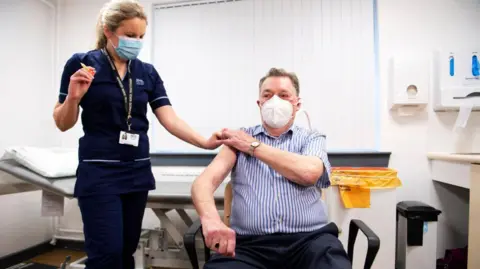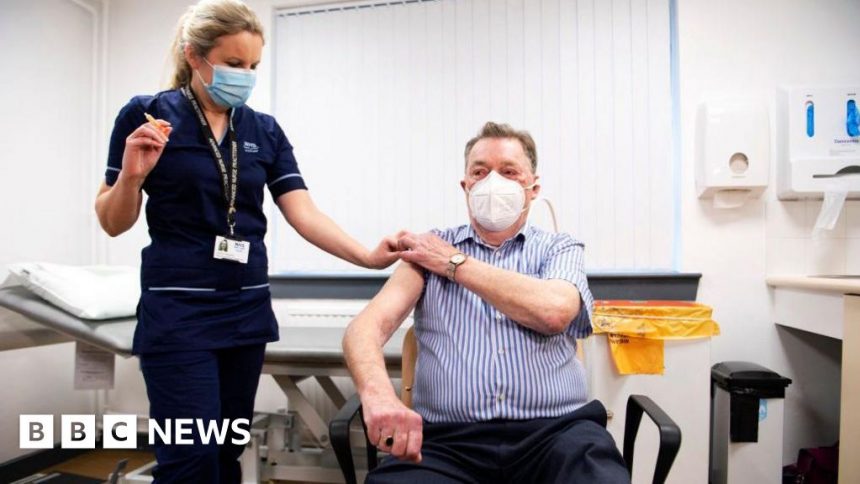Covid deaths rise as booster vaccine take-up falls
 Getty Images
Getty ImagesHundreds of thousands of vulnerable people in Scotland have not received the latest Covid booster as part of the spring vaccination campaign, BBC Scotland analysis of official health figures shows.
It comes as the latest figures show deaths from Covid continue to rise.
The figures from Public Health Scotland show 49 deaths in the week beginning 1 July, with almost three-quarters of them in the over-75 age group.
The vaccine data shows almost 260,000 at-risk people – including the elderly, those in care homes and those with weakened immune systems – had not received the latest booster by the programme’s end date on 30 June.
The Scottish government said some health boards are still vaccinating people who were unable to come forward during the spring campaign.
Thousands not vaccinated with spring booster
The spring booster programme, which followed the Joint Committee on Vaccination and Immunisation (JCVI) guidance, prioritised vaccination for adults living in care homes, people aged 75 and above and those with weakened immune systems.
Those with weakened immune systems had the lowest spring booster vaccination take-up with more than half (54.5%) not receiving the booster – more than 105,000 people.
Among the over-75s, more than a quarter (27.3%) – 147,000 people – had not received the jab.
More than 6,000 care home residents had not had the booster, representing 18.7% of those eligible.
The figures cover the period up to 7 July 2024.
NHS Greater Glasgow and Clyde had the greatest proportion of eligible people not vaccinated with a spring booster, the figures showed.
In total 41% of those eligible in the health board area had not received the booster, representing almost 54,000 people.
NHS Lanarkshire, which had 40.2% not taking up the booster and NHS Western Isles had 39.8%, were the next highest.
Low take-up across UK
Additional figures out from Public Health Scotland show there were 459 acute hospital admissions due to Covid in the week ending 7 July, a slight drop on the previous week’s figure when 462 were reported.
Prof Antonia Ho, clinical senior consultant in infectious diseases, at the University of Glasgow, said the latest Covid wave was likely to be due to new variants and waning immunity from vaccination and infection.
She said: “I think it’s disappointing that the number of people that have taken up the spring booster has declined and I think that’s true across the country.”
In England there is a similarly low uptake of the spring booster. Data published by the UK Health Security Agency shows 37.7% of eligible people did not receive the spring vaccine, as of 3 July.
“We don’t have a very good handle on how much infection there is because there is so little testing now. We’re only seeing the tip of the iceberg,” Prof Ho added.
“Covid hasn’t settled down into a winter seasonality like other respiratory viruses like flu or RSV so we’re seeing waves outside of winter and the wave is causing severe disease in some individuals as some people are being admitted to hospital.
“We know vaccines are the best armour that we have to fight against severe disease and hospital admissions but immunity from vaccines doesn’t last very long and that’s why we need to keep giving boosters.”
Recent uptick in deaths
Death registration data published by the National Records of Scotland also shows Covid-related deaths have increased.
In the week beginning 1 July, 49 Covid-related deaths were registered in Scotland, a 53.1% increase on the previous week’s figures when 32 were registered.
Of the registered deaths 35 (71.4%) were aged 75 or above.
In total 555 deaths have been registered in Scotland this year. The deaths had Covid as either an underlying cause or as a contributory cause of death.
Some health boards still vaccinating
A spokesperson for the Scottish government said: “Those at extreme high risk from Covid-19, such as stem cell transplant patients and the severely immunosuppressed, can access vaccinations year-round via local clinical referral procedures.
“Although the programme ended on 30 June, some health boards are vaccinating those who were unable to come forward during the programme, until 14 July,” the spokesperson said.
“We encourage those eligible, who are yet to be vaccinated, to check with their local health board.”





